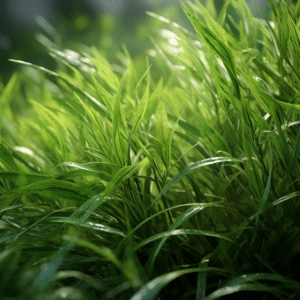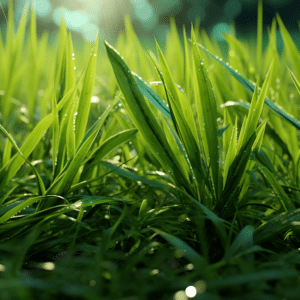If you’re looking to have a lush green lawn, growing grass is the first step towards achieving that goal. By understanding the basics of lawn care, preparing your lawn for seeding, going through the proper seeding process, and maintaining your lawn post-seeding, you can ensure healthy and vibrant grass growth. This comprehensive guide will provide you with all the information you need to grow a beautiful and thriving lawn.
Understanding the Basics of Lawn Care

Before diving into the specifics of growing grass, it’s important to understand the foundational aspects of lawn care. One crucial factor to consider is the importance of soil quality when it comes to grass growth. The soil acts as the foundation for your lawn, supporting the development of roots and providing essential nutrients. Testing the soil’s pH level and making necessary improvements will contribute to optimal grass growth.
When it comes to soil quality, there are various factors to consider. The texture of the soil, for example, plays a significant role in determining its quality. Sandy soil drains quickly, which can be beneficial in preventing waterlogging, but it may require more frequent watering. On the other hand, clay soil retains water for longer periods, but it can become compacted and hinder root growth. Loamy soil, with its balanced composition of sand, silt, and clay, is often considered ideal for grass growth as it provides good drainage while retaining moisture and nutrients.
In addition to soil texture, the soil’s nutrient content is crucial for healthy grass growth. Essential nutrients such as nitrogen, phosphorus, and potassium are necessary for the development of strong roots, vibrant green color, and overall plant health. Conducting a soil test will help determine the nutrient deficiencies or imbalances, allowing you to make informed decisions about fertilization.
Another vital aspect of lawn care is choosing the right grass type for your specific needs. Different grass species thrive under different conditions, such as sun exposure and shade. Evaluating the amount of sunlight your lawn receives and considering any areas of shade will help you select the most suitable grass type.
There are several common grass types to choose from, each with its own characteristics and requirements. For example, cool-season grasses like Kentucky bluegrass and tall fescue are well-suited for regions with cold winters and hot summers. They have excellent tolerance to foot traffic and recover quickly from damage. Warm-season grasses such as Bermuda grass and Zoysia grass, on the other hand, thrive in hot climates with mild winters. They are known for their drought tolerance and ability to withstand high temperatures.
Aside from sunlight and shade, other factors to consider when selecting a grass type include soil type, maintenance requirements, and intended use of the lawn. Some grasses are more resistant to pests and diseases, while others may require more frequent mowing or watering. By carefully considering these factors, you can choose a grass type that will thrive in your specific environment and meet your desired aesthetic and functional needs.
Preparing Your Lawn for Seeding

Before you can start seeding your lawn, proper preparation is essential. Clearing the area of any debris, such as rocks or sticks, ensures a smooth and even surface for grass seed to grow. Additionally, testing and improving the soil’s pH level will provide an optimal environment for germination. Lastly, properly grading your lawn ensures adequate drainage and prevents waterlogging, which can hinder grass growth.
When it comes to clearing the area of debris, it’s important to be thorough. Take the time to carefully inspect the entire lawn, removing any rocks, sticks, or other objects that could interfere with the growth of your new grass. Even the smallest pebble can create an uneven surface, making it difficult for the grass seed to establish strong roots.
Once the debris has been cleared, it’s time to focus on the soil’s pH level. Testing the pH level of your soil is crucial because it determines the availability of essential nutrients to the grass. You can easily purchase a soil testing kit from a local garden center or have a professional test it for you. Based on the results, you may need to adjust the pH level by adding lime to raise it or sulfur to lower it. This step ensures that your grass seed will have the best possible chance of germinating and thriving.
Properly grading your lawn is another important aspect of preparing for seeding. Grading involves creating a slight slope that allows water to drain away from the surface, preventing waterlogging. This is especially crucial if your lawn is prone to flooding or has areas with poor drainage. By grading your lawn, you are essentially creating a more hospitable environment for your grass seed to grow, as excess water can suffocate the seeds and hinder their development.
When grading your lawn, it’s important to consider the natural contours of the land. You want to create a gentle slope that directs water away from the house and any other structures. This can be achieved by using a rake or a lawn roller to even out any uneven areas. Additionally, you may need to add topsoil to low spots to ensure a more consistent grade.
Overall, proper preparation is key to successfully seeding your lawn. By taking the time to clear the area of debris, test and improve the soil’s pH level, and properly grade the lawn, you are setting the stage for healthy and lush grass growth. Remember, a well-prepared lawn not only enhances the overall appearance of your property but also provides a welcoming space for outdoor activities and relaxation.
The Seeding Process
Once your lawn is adequately prepared, it’s time to move on to the actual seeding process. Choosing the right time to seed is crucial, as it determines the success of your grass growth. Typically, early fall or spring is the best time to seed, when temperatures and moisture levels are favorable.
During the seeding process, there are several factors to consider to ensure optimal results. One important aspect is selecting the right type of grass seed for your specific lawn conditions. Different grass varieties have different growth habits, tolerance to shade, and resistance to diseases and pests. Researching and choosing the appropriate grass seed will help you achieve a lush and healthy lawn.
Before spreading the grass seed, it’s essential to prepare the soil properly. This involves removing any debris, such as rocks or weeds, and loosening the top layer of soil to create a favorable environment for seed germination. You can use a rake or a garden tiller to accomplish this task, ensuring that the soil is loose and crumbly.
Once the soil is prepared, there are various techniques for spreading grass seed. One popular method is using a broadcast spreader, which evenly distributes the seed over a large area. This tool allows for efficient coverage and ensures that the seed is dispersed evenly. Alternatively, you can choose to hand-spread the seed, which gives you more control over the distribution but may be more time-consuming for larger areas.
Regardless of the method you choose, it’s crucial to distribute the seed evenly to achieve consistent coverage. Uneven distribution may result in patchy areas or sparse growth. To ensure even spreading, consider dividing your lawn into smaller sections and spreading the seed in a back-and-forth motion, overlapping each pass slightly.
After seeding, proper watering is vital to promote germination and ensure the seed makes good contact with the soil. Watering should be done gently and consistently to avoid washing away the seeds or creating puddles. A light misting or using a sprinkler system with a fine spray setting is recommended. The goal is to keep the soil moist but not saturated, as excessive water can lead to fungal diseases or rotting of the seeds.
It’s important to monitor the moisture levels of the soil regularly. Depending on the weather conditions, you may need to water the newly seeded area multiple times a day or adjust the watering frequency accordingly. As the grass seed germinates and establishes, you can gradually reduce the frequency of watering while ensuring the soil remains adequately moist.
During the germination period, it’s crucial to avoid walking or mowing over the newly seeded area. The delicate young grass shoots are vulnerable to damage, and any disturbance can hinder their growth. It’s best to wait until the grass reaches a height of at least three inches before mowing for the first time.
Maintaining Your Lawn Post-Seeding
Once your grass begins to sprout, it’s crucial to maintain a consistent watering schedule. Regular watering, especially during dry periods, will help establish strong and healthy root systems. Adequate moisture is vital during the initial growth stages of your grass.
Another essential aspect of lawn maintenance is fertilizing. Applying fertilizer to your lawn provides the necessary nutrients to support grass growth. Be sure to follow the recommended application rates to prevent over-fertilization, which can harm the grass.
In addition to watering and fertilizing, mowing techniques also play a significant role in maintaining a healthy lawn. Regular mowing promotes lateral growth and helps develop a thicker and more resilient turf. Adjusting the mower height to the appropriate level for your grass type is essential for optimal cutting.
By following these comprehensive steps and understanding the importance of proper lawn care, you can successfully grow grass and achieve a lush and vibrant lawn. With patience and consistent maintenance, you’ll be able to enjoy the beauty of your healthy grass and create an inviting outdoor space for yourself and others to enjoy.